#only if The Author is actually The Filmmaker
Explore tagged Tumblr posts
Text
okay so love the idea of the narrator also being scripted but its so hard to do it fanfiction! if youre narrating, you have a narrator! it might even be the narrator himself (love fanfics that the narrator is the narrator and never get out of character)
so i was thinking, okay, how do we get the narrator and stanley together without a narrator? show dont tell! movies, animation! maybe thats why sad-ist clock 0ut series is so juicy, it scratches that part of my brain that was itchy
#the stanley parable#a little ramble#i love stories talking about stories thank u dimension 20 neverafter#how does The Author even say anything in the story without The Narrator yk#only if The Author is actually The Filmmaker
16 notes
·
View notes
Text

The latest questions are centered around Anat Schwartz, an Israeli who co-authored several of the paper’s most widely circulated reports, including the now well-known and scrutinized December 28 article headlined: “‘Screams Without Words’’ How Hamas Weaponized Sexual Violence on Oct. 7.” Independent researchers scrutinized the online record, and raised serious questions about Schwartz. First, she has apparently never been a reporter but is actually a filmmaker, who the Times suddenly hired in October. You would expect the paper to look for someone with actual journalistic experience, especially for a story as sensitive as this one, written during the fog of war. Surely the paper had enough of its own correspondents on staff who could have been assigned to it. Next, the researchers found that Schwartz had not hidden her strong feelings online. There are screenshots of her “liking” certain posts that repeated the “40 beheaded baby” hoax, and that endorsed another hysterical post that urged the Israeli army to “turn Gaza into a slaughterhouse,” and called Palestinians “human animals.” (Just this morning, more evidence emerged online; Schwartz apparently also served in Israeli Military Intelligence.) Finally, one of her co-authors on two of the reports was Adam Sella, who is her nephew. Let’s pause here. What would happen if the Times suddenly hired a Palestinian filmmaker with no journalistic background, who had recently publicly “liked” posts that called for “pushing Israeli Jews into the sea,” to co-write several of its most sensitive and contested reports?
[...]
There’s another related example of how the Times has botched the sexual violence story. One of the first Israeli organizations that arrived on the scene of the Hamas attack was Zaka, a volunteer group that recovers dead bodies. On January 15, Times reporter Sheena Frankel wrote a positive profile of the group; she included 3 or 4 sentences of criticism, only to quickly dismiss them. This site had already raised serious doubts about Zaka weeks earlier, pointing out that “the organization’s volunteers have systematically given false testimonies, and continue repeating them to journalists on behalf of the Israel government.” Then, on January 31, the Israeli daily Haaretz published a long investigation, that highlighted “cases of negligence, misinformation and a fundraising campaign that used the dead as props.” Haaretz cited one Zaka report that said a volunteer had seen a murdered pregnant woman, with the baby still attached by the umbilical cord — before concluding that the incident “simply didn’t happen.” At this stage, there are serious doubts about many aspects of Israel’s overall account about October 7. Only a genuinely independent and impartial investigation might some day get closer to the truth. But meanwhile, at the very least the New York Times must publicly recognize its errors, and assign new, unbiased reporters to try to clean up its mess.
Continue reading
2K notes
·
View notes
Text

The movie Cannibal Holocaust, which was directed by Ruggero Deodato and released in 1980, is said to be one of the most controversial films in cinematic history.
The film is presented as a found-footage documentary, and follows a group of filmmakers who venture into the Amazon rainforest to document indigenous tribes, only to encounter horrifying violence. The extreme depictions of gore and real animal killings led to it being censored in various places.
The controversy reached its peak when Deodato was arrested shortly after the film’s release, as authorities believed that the movie depicted actual murders. To clear his name, Deodato had to prove that the actors were alive and that the scenes of human violence were staged. Nevertheless, Cannibal Holocaust remained banned or heavily censored in numerous countries due to its graphic content.
197 notes
·
View notes
Text

NAHLA AL-ARIAN HAS been living a nightmare for the past seven months, watching from afar as Israel carries out its scorched-earth war against her ancestral homeland in the Gaza Strip. Like many Palestinian Americans, the 63-year-old retired fourth-grade teacher from Tampa Bay, Florida, has endured seven months of a steady trickle of WhatsApp messages about the deaths of her relatives. “You see, my father’s family is originally from Gaza, so they are a big family. And they are not only in Gaza City, but also in Deir al Balah and Khan Younis, other parts,” Al-Arian told me. Recently, the trickle of horrors became a flood: “It started with like 27, and then we lost count until I received this message from my relative who said at least 200 had died.” The catastrophe was the backdrop for Al-Arian’s visit last week to Columbia University in New York City. Al-Arian has five children, four of whom are journalists or filmmakers. On April 25, two of her daughters, Laila and Lama, both award-winning TV journalists, visited the encampment established by Columbia students to oppose the war in Gaza. Laila, an executive producer at Al Jazeera English with Emmys and a George Polk Award to her name, is a graduate of Columbia’s journalism school. Lama was the recipient of the prestigious 2021 Alfred I. duPont–Columbia Award for her reporting for Vice News on the 2020 explosion at the port of Beirut. The two sisters traveled to Columbia as journalists to see the campus, and Nahla joined them. “Of course, I tagged along. You know, why would I sit at the hotel by myself? And I wanted to really see those kids. I felt so down,” she said. “I was crying every day for Gaza, for the children being killed, for the women, the destruction of my father’s city, so I wanted to feel better, you know, to see those kids. I heard a lot about them, how smart they are, how organized, you know? So I said, let’s go along with you. So I went.” Nahla Al-Arian was on the campus for less than an hour. She sat and listened to part of a teach-in, and shared some hummus with her daughters and some students. Then she left, feeling a glimmer of hope that people — at least these students — actually cared about the suffering and deaths being inflicted on her family in Gaza. “I didn’t teach them anything. They are the ones who taught me. They are the ones who gave me hope,” she recalled. “I felt much better when I went there because I felt those kids are really very well informed, very well educated. They are the conscience of America. They care about the Palestinian people who they never saw or got to meet.” Her husband posted a picture of Nahla, sitting on the lawn at the tent city erected by the student protesters, on his Twitter feed. “My wife Nahla in solidarity with the brave and very determined Columbia University students,” he wrote. Nahla left New York, inspired by her visit to Columbia, and returned to Virginia to spend time with her grandchildren. A few days later, that one tweet by her husband would thrust Nahla Al-Arian into the center of a spurious narrative promoted by the mayor of New York City and major media outlets. She became the exemplar of the dangerous “outside agitator” who was training the students at Columbia. It was Nahla’s presence, according to Mayor Eric Adams, that was the “tipping point” in his decision to authorize the military-style raids on the campus.
On February 20, 2003, Nahla’s husband, Sami Al-Arian, a professor at the University of South Florida, was arrested and indicted on 53 counts of supporting the armed resistance group Palestinian Islamic Jihad. The PIJ had been designated by the U.S. government as a terrorist organization, and the charges against Al-Arian could have put him in prison for multiple life sentences, plus 225 years. It was a centerpiece case of the George W. Bush administration’s domestic “war on terror.” When John Ashcroft, Bush’s notorious attorney general, announced the indictment, he described the Florida-based scholar as “the North American leader of the Palestinian Islamic Jihad, Sami Al-Arian.” Among the charges against him was conspiracy to kill or maim persons abroad, specifically in Israel, yet the prosecutors openly admitted Al-Arian had no connection to any violence. He was a well-known and deeply respected figure in the Tampa community, where he and Nahla raised their family. He was also, like many fellow Palestinians, a tenacious critic of U.S. support for Israel and of the burgeoning “global war on terror.” His arrest came just days before the U.S. invaded Iraq, a war Al-Arian was publicly opposed to. The Al-Arian case was, at its core, a political attack waged by Bush’s Justice Department as part of a wider assault on the rights of Muslims in the U.S. The government launched a campaign, echoed in media outlets, to portray Al-Arian as a terror leader at a time when the Bush administration was ratcheting up its so-called global war on terror abroad, and when Muslims in the U.S. were being subjected to harassment, surveillance, and abuse. The legal case against Al-Arian was flimsy, and prosecutors largely sought to portray his protected First Amendment speech and charitable activities as terrorism. The trial against Al-Arian, a legal permanent resident in the U.S., did not go well for federal prosecutors. In December 2005, following a six-month trial, a jury acquitted him on eight of the most serious counts and deadlocked 10-2 in favor of acquittal on the other nine. The judge made clear he was not pleased with this outcome, and the prosecutors were intent on relitigating the case. Al-Arian had spent two years in jail already without any conviction and was staring down the prospect of years more. In the face of this reality and the toll the trial against him had taken on his family, Al-Arian agreed to take a plea deal. In 2006, he pleaded guilty to one count of providing nonviolent support to people the government alleged were affiliated with the PIJ. As part of the deal, Al-Arian would serve a short sentence and, with his residency revoked, get an expedited deportation. At no point during the government’s trial against Al-Arian did the prosecution provide evidence he was connected to any acts of violence. For the next eight years following his release from prison in 2008, Al-Arian was kept under house arrest and effectively subjected to prosecutorial harassment as the government sought to place him in what his lawyers characterized as a judicial trap by compelling him to testify in a separate case. His defense lawyers alleged the federal prosecutor in the case, who had a penchant for pursuing high-profile, political cases, held an anti-Palestinian bias. Amnesty International raised concerns that Al-Arian had been abused in prison and he faced the prospect of yet another lengthy, costly court battle. The saga would stretch on for several more years before prosecutors ended the case and Al-Arian was deported from the United States.
“This case remains one of the most troubling chapters in this nation’s crackdown after 9-11,” Al-Arian’s lawyer, Jonathan Turley, wrote in 2014 when the case was officially dropped. “Despite the jury verdict and the agreement reached to allow Dr. Al-Arian to leave the country, the Justice Department continued to fight for his incarceration and for a trial in this case. It will remain one of the most disturbing cases of my career in terms of the actions taken by our government.” That federal prosecutors approved Al-Arian’s plea deal gave a clear indication that the U.S. government knew Al-Arian was not an actual terrorist, terrorist facilitator, or any kind of threat; the Bush administration, after all, was not in the habit of letting suspected terrorists walk. Al-Arian and his family have always maintained his innocence and say that he was being targeted for his political beliefs and activism on behalf of Palestinians. He resisted the deal, Nahla Al-Arian said. “He didn’t even want to accept it. He wanted to move on with another trial,” Nahla said. “But because of our pressure on him, let’s just get done with it [because] in the end, we’re going leave anyway. So that’s why.” Sami and Nahla Al-Arian now live in Turkey. Sami is not allowed to visit his children and grandchildren stateside, but Nahla visits often.
#yemen#jerusalem#tel aviv#current events#palestine#free palestine#gaza#free gaza#news on gaza#palestine news#news update#war news#war on gaza#columbia university#students for justice in palestine#gaza solidarity encampment#police brutality#islamophobia#war on terror#gaza genocide#genocide
464 notes
·
View notes
Text
The OTHER type of Star Wars fan
We've already covered (through this longer post and this addendum) that research shows George wasn't that involved or interested in the derivative material of the Star Wars franchise, also known as the Expanded Universe (EU). Aside from approving a few points, he let Howard Roffman and Lucasfilm Licensing handle it.
He is the first to say that he ain't as knowledgeable about Star Wars lore as we fans are.
Thing is... he's also not as passionate as we are.
Recently, I was watching some Q&A videos of George R.R. Martin, the author of Game of Thrones... and it occurred to me:
Martin is what most Star Wars fans wish Lucas was.
Think about it.
He's a talented writer who likes to focus on morally "gray" characters and complex political plotlines,
who created a series of novels for a mature audience in which his narrative merely asks questions and lets the reader draw their own conclusions,
knows and engages in the lore behind his creation and will often respond to those lore-heavy questions, and has gone on record stating that canon is the glue that holds a story together and keeps it coherent.
Contrast that with George "continuity is for wimps" Lucas, who:
Wrote a movie franchise which is also, partially, political... but he makes it for kids, and he's explicit about how this is thematically a clear-cut story about how the conflict of "good vs evil" is really about "compassion vs greed",
with flat dialogue, boring cinematography,
and whose approach to lore and canon can be summed up in his answer to how Anakin got his scar:
"I don't know. Ask Howard [Roffman]. That’s one of those things that happens in the novels between the movies. I just put it there. He has to explain how it got there. I think Anakin got it slipping in the bathtub, but of course, he's not going to tell anybody that." - Pablo Hidalgo’s set diary, August 2003
And as a Star Wars fan, I will admit that some of his casual retcons felt disrespectful, growing up.
"Boba Fett is NOT Mandalorian?!"
I had the same reaction when I saw an interview of Kathleen Kennedy stating she was a fan of Star Wars... from a filmmaking perspective. That seemed like such a finagling cop-out for me, at the time.
"Just say you're not a real fan, God!"
And it's easy to divide it in two camps, like that. You have 1) the real fans, who will delve into deep lore, and 2) the average moviegoer, also known as the "filthy casuals."
But looking back on it... holy shit, that is actually a completely valid way of being a Star Wars fan.
Yes, Star Wars is a transmedia franchise, it's books, it's video-games, it's deep lore, it's lightsabers and Jedi and Sith and bounty hunters and Ewoks and Jabba and High Republics and Tython and Revan etc.
But before it was that, Star Wars was a filmmaking revolution. A juggernaut of innovation for the silver screen that inspired most of today's filmmakers.
So, sure, George Lucas isn't an avid lore-loving Star Wars fan like you and me. But he is a movie fan.
"I'm not that passionate about this story. I like it, it's fun and I enjoy doing it. But it's definitely not my life. I'm a bigger movie fan than I am Star Wars fan. I like making movies. At the end of nine years of making Star Wars, I was not ready to continue it. I was completely burned out on it. I was more passionate about raising my kids than making movies and especially making Star Wars. So I made other kinds of movies and TV shows and advanced the technology I needed. It's not a matter of passion. My passion is for filmmaking. I'll go and do filmmaking that is easier to do, where you can realise your ideas better. And nine years is a big part of your life, and to commit to another nine years, I didn't wanna do that right away." - EMPIRE, 1999
And you can tell this, when you watch the Star Wars films.
There are honestly so many homages and interesting filmmaking techniques, peppered throughout the six films, which only a nerd for cinema history like George would know how to implement.
C3-PO being based on the droid from Metropolis (1927) is a perfect example of this.
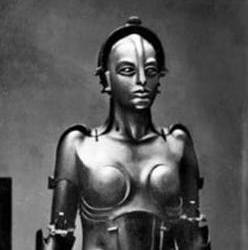

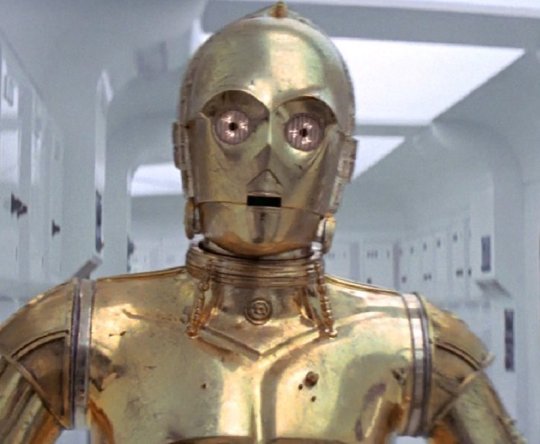
And that's interesting.
Because there's essentially this entire other dimension to the films, where it's not just the story unfolding, but to filmmakers it's also a series of techniques that make them go "I wonder how they did that!" or homages that make them go "OH! I know where that's from!" like we do when an comics characters appears in live-action.
Here's other examples:

CINEMA HOMAGES
All of Star Wars is absolutely littered with homages to cinema history.
I mean, you may already know this, but Flash Gordon is what George originally wanted to shoot, but the copyright holders said they only wanted Fellini to direct it (ironically, George wasn't artsy-fart enough for them). So he decided to write Star Wars instead.
As such, the inspiration from Flash Gordon is also present visually and spiritually throughout the two trilogies.

"It was like a Republic serial, a 1930s-style matinee adventure. The idea was that you came in, saw Episode IV, had missed the first three episodes, and wouldn't get to see the rest of it." - Starlog Magazine #300, 2002

The dialogue that a lot of people refer to as "campy" and "flat" is actually a mix of George being an experimental filmmaker who doesn't give much of a fuck about dialogue (and is by his own admission, not the best at it)...
"I'd be the first person to say I can't write dialogue. My dialogue is very utilitarian and is designed to move things forward. I'm not Shakespeare. It's not designed to be poetic. It's not designed to have a clever turn of phrase. [...] I just wanted to get from point A to point B. This film doesn't lend itself to that sort of thing because it's not about snappy one-liners. I think that Lethal Weapon-style dialogue is overused, it's a necessary aspect of high action films where you have to have the smart retort. You have to say "I'll be back baby" and stuff. It's not my style. It takes away from the integrity of the movie. [...] I'm aware that dialogue isn't my strength. I use it as a device. I don't particularly like dialogue which is part of the problem." - EMPIRE, 1999
... which is convenient, because it helped him simulate the dialogue of 1930s matinee serials, such as Flash Gordon.
"Let’s face it, their dialogue in that scene is pretty corny. It is presented very honestly, it isn’t tongue in cheek at all, and it’s played to the hilt. But it is consistent, not only with the rest of the movie, but with the overall Star Wars style. Most people don’t understand the style of Star Wars. They don’t get that there is an underlying motif that is very much like a 1930s Western or Saturday matinee serial. It’s in the more romantic period of making movies and adventure films. And this film is even more of a melodrama than the others." - Mythmaking: Behind the Scenes of Attack of the Clones, 2002
But beyond that, literally it's everywhere.
The scene where Palpatine ascends to being Emperor as Anakin slaughters his political rivals parallels the final scene in The Godfather, where Michael becomes the Don while his goons do the same thing.
This video compiles all the tributes beautifully. Check it out.
youtube
Even The Clone Wars has whole episodes that are direct homages to cult classics. The Zillo Beast episode is a clear reference to Godzilla, the episode The Wrong Jedi is inspired by The Wrong Man, etc.

"CINEMA VÉRITÉ" CINEMATOGRAPHY
I've already written a whole post (one of my favourites) showing how his fascination with cinéma vérité documentaries is reflected in the cinematography of all six Star Wars films, and it's part of what makes the entire franchise feel so immersive.
You can check it out here:

KUROSAWA
We've gone over how he's a big fan of Akira Kurosawa, and how big an influence Hidden Fortress was on both the Star Wars trilogies...
... but so is the mise-en-scène and the way George approaches production design. The reason Star Wars feels so "lived in" is also a lesson George learned from Kurosawa, which is that by making everything just a bit off-kilter, a bit dirtied-up and imperfect...
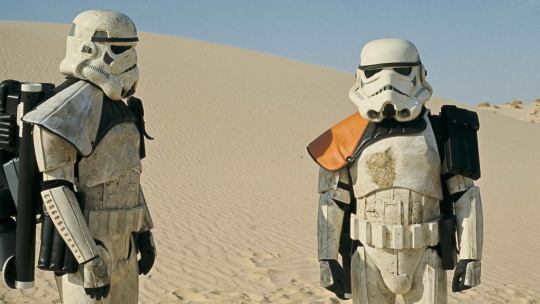

... and yet keeping it all consistent, in a way, you manage to make the film feel grounded and immersive, no matter how alien it is.
"[It] may sound odd in a movie like this, but credibility and realism, even in the most unrealistic situation… to sorta create that sense of realism is very important to making the story work and making you feel like you’re actually in the environment that transports you and gives you the suspension of disbelief that you need in order to enjoy a movie. [...] Kurosawa used to call it “immaculate realism” which is to make it slightly off-kilter, slightly eccentric, like things are in real life. Even if it’s a very predictable situation, give it that little funny edge that takes it away from that and makes it realistic. And I had to struggle very hard, in the Star Wars films, to make them appear to be realistic, even though they’re totally fantasy." - The Phantom Menace, Commentary Track #2, 1999

POST-PRODUCTION & VFX
Another one of the more impressive aspects of the first Star Wars was the dogfights and the trench raid of the Death Star. The camera pans with the spaceship, the dynamism of the cuts. The space battles is what made George creat ILM in the first place.
He was determined to do the opposite of what 2001: A Space Odyssey had done with that opening scene where the space ship moves into frame slooooowly...

... so he gave the team a collection of WWII dogfight footage to give them ideas.

(note: this was the same approach he would take years later with Dave Filoni, when teaching the latter how to edit and craft dogfights in The Clone Wars)
The attempt to film the trench run eventually led to the creation of the first motion control camera dolly.

Best analogy I can think of, when describing George's approach to Star Wars, is the following:
An avant-garde esoteric contemporary artist - y'know, the type who puts a blue dot on a white canvas and calls it art - creates a comic.
Why? Because he wants to make this one art installment for a gallery exhibition. After that, he intends to move on to other things.
But the comic is really good! And like, its audience quickly expands beyond just gallery visitors, no, everyone likes it.
Suddenly, the comic develops a cult following, and the entirety of comic book geek culture has zeroed-in on the artist and they're all asking him to make more art! And he makes more! And more!
Then he stops for two decades, moves on to other art projects, raises his kids. Years later, he discovers new ways of drawing, and he's like "I'm making a Prequel to the comic, y'all wanna see it?"
Everyone cries out gleefully: "Oh God, yes! Finally! Show us!"
But this motherfucker makes a manga.
Why? Because he feels like it.
And of course he does, he's just creating art, right? He discovered the graphic tablet, so he's having fun with it, because he's always innovating and pushing the envelope with his art.
And the books are fine, by manga standards. But by comic book standards, they obviously suck! The comic book audience is mad. They wanted another comic book, not a manga. Why is it in black and white? Why is read right-to-left? This comic is crap!
(And arguably, they have a point... as a savvy businessman, he's made a whole lot of money off this comic, he built a media empire out of it, and instead of giving them what they want, he made something else)
But again... this guy isn't a comic book illustrator, and has been very explicit about saying this.
He's an artist who - for a very specific project - drew a comic.

Many things can be true at once:
the fact that these creative decisions didn't always hit their mark for the average moviegoer, or fans of "Star Wars, the space fantasy movies and expanded universe" (usually the lore-loving geeks like myself)...
... and the fact that they were meticulously and carefully crafted in a way that fans of "Star Wars, the revolutionary film" (aka fans of cinema and filmmaking) can appreciate.
There's a spectrum of the fandom, and there is a spectrum in the way we can appreciate Star Wars. Which kinda reminds me of that scene in Chef (2014) where Carl goes on a rant explaining the intricacies of making his chocolate lava cake to a food critic.
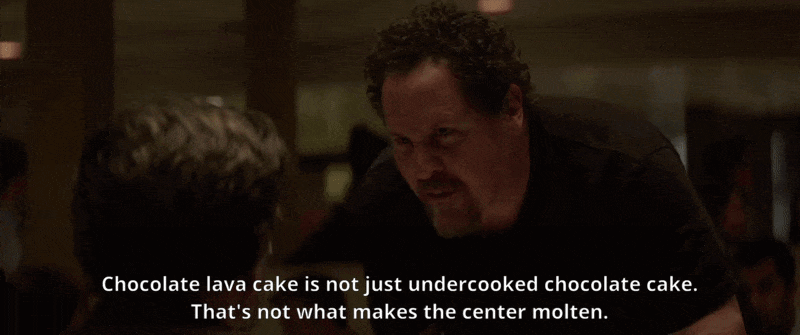
It's not just undercooked chocolate. It's molten.
Conversely:
It's not just flat, campy dialogue. It's an homage to the 1930s matinee serials à la Flash Gordon.
It's not just boring cinematography. It's a reproduction of cinéma vérité documentary-style camera work which effectively grounds the film.
Having considered all this, when I hear that Tony Gilroy or Kathleen Kennedy were more fans of Star Wars from a "cinema studies" side rather than the typical pop culture one, I think it's fair enough.
First of all, because like it or not, so was George. He clearly didn't give a single crap about the offshoot comics and books and their lore, besides signing off on minor plot points. He's not a "sci-fi movie director", he's an experimental filmmaker who set some of his movies in space.
But secondly, because - aside from children - it's clear the audience he was targeting was not the fans or the critics... but these very same cinema-savvy people, who get his references and homages, and who were inspired by the new filmmaking techniques he introduced.
333 notes
·
View notes
Note
hey!! i am genuinely curious about how the catholic church helped implement the hays code, would you be able to tell me more/do you have any good reading material about it? thanks so much!!
This has been sitting in my inbox for aaaaaages, because I want to do it justice! It's actually a big facet of my research project that I'm going to go into much, much, much more depth on, but here's the short(er) summary:
The foundational text of the Hays Code was written by two Catholics: a Jesuit priest named Father Daniel Lord, and a man named Martin Quigley, who was the editor of the Motion Picture Herald. They grounded their guidelines in Catholic morality and values, based on the idea that art could be a vehicle for evil by negatively influencing the actions of those who view it.
The original list of guidelines written by Lord and Quigley was adapted into the Production Code, popularly known as the "Hays Code" after William Hays, the president of the Production Code Administration that enforced it. As president of the PCA, William Hays appointed a staunch Catholic man called Joseph Breen to enforce the code. Breen enforced it aggressively, confiscating the original reels of films he deemed inappropriate and against the Code. Many lost films from this era are only "lost" because Joseph Breen personally had them destroyed. Some were rediscovered later, but many were completely purged from existence.
When Breen died in 1965, Variety magazine wrote, "More than any single individual, he shaped the moral stature of the American moral picture." He was a very, very big deal, and was directly responsible for censoring more films than I could even begin to list here.
In 1937, Olga J. Martin, Joseph Breen’s secretary, said, “To an impoverished country which had become religious and serious-minded, the sex attitudes of the post-war period became grotesquely unreal and antedated. The public at large wanted to forget its own derelictions of the ‘gay twenties.' The stage was set for the moral crusade.”
In 1936, once the Code was being fully enforced on filmmakers by Joseph Breen, a letter was issued by the office of Pope Pius XI that praised Breen's work, and encouraged all good Catholics to support film censorship.
The letter read in part, "From time to time, the Bishops will do well to recall to the motion picture industry that, amid the cares of their pastoral ministry, they are under obligation to interest themselves in every form of decent and healthy recreation because they are responsible before God for the moral welfare of their people even during their time of leisure. Their sacred calling constrains them to proclaim clearly and openly that unhealthy and impure entertainment destroys the moral fibre of a nation. They will likewise remind the motion picture industry that the demands which they make regard not only the Catholics but all who patronize the cinema."
Basically, this letter was a reminder from the Papal authority that bishops and priests are supposed to stop people from engaging with "lewd" or "obscene" art. That meant supporting things like the Hays Code.
So, to summarize: the original text of the Hays Code was written by two Catholics, including a priest. The biggest and most aggressive censor under the Code was a Catholic man, who had the full support and approval of the Pope at the time. Good Catholics were called en-masse to support the Hays Code, because it was intentionally written to line up with Catholic teachings.
There's a lot more to say on the subject, and if you're interested in reading more on your own, I recommend the book "Pre-Code Hollywood: Sex, Immorality, and Insurrection in American Cinema, 1930-1934," by Thomas Doherty. There are plenty other sources I can recommend on request, but that's a solid place to start.
(And if I can toot my own horn, I'm intending to do a video lecture series all about American film censorship and the Hays Code. Pledging to my Patreon helps keep me fed and housed while I do all this damn research.)
1K notes
·
View notes
Text
I DIG YOUR CINEMA (5)
harry styles x yn aspiring filmmaker — social media AU
About the smau: yn starts posting videos on youtube and is trying to build a career as a filmmaker. Things are going pretty well for her and she starts getting more attention when she creates content about shows she goes to. She’s also a fan of Harry’s music and some of his fans start getting suspicious when his team starts interacting with her.
Disclaimer: The story it’s set in 2021 and it will follow their relationship through the LOT leg in the US. Since this is nothing but fiction, I will be following some of the real timeline but also adding my own stuff. On top of that, I won’t be basing myself on Harry’s actual posts.
~~~~~~~~~~~~~~~~~
PART 4 — THE VIDEO // MASTERLIST
~~~~~~~~~~~~~~~~~
I DIG YOUR CINEMA (PART 5) — FROM SAN ANTONIO TO DALLAS

liked by bestfriend, sisterinlaw, cuteguy and 63,157 others
yourinstagram sightseeing tonight 😍 getting to know these cities only gets better and better guys
view all 9,105 comments
harryfan7 was this before or after dinner with harry? 😏
↳ harryfan3 stoppp. my heart cant take it ↳ harryfan11 no bc the idea of them walking together and stopping to take pictures it’s just so 🤏
lookitsnyoh 🦭 pillowpersonpp 🦥 anthonypham 🧸
↳ harryfan not the teddy bear!!!
harryfan117 MISS SARAH JONES IS HERE user8 whats with all the emojis guys!! let me innnnn user1 YOU’RE BACK 🥰 bestfriend its not the city its all you baby bc you light up the world like nobody else
↳ harryfan that was just… ↳ harryfan5 HEJAHDH NO YOU DIDNR ↳ yourinstagram …. ↳ yourinstagram i dont even know how to react ↳ bestfriend wish i could say im sorry or embarrassed but im actually not
cuteguy Looks amazing!
Sep 10, 2021 •
~~~~~~~~~~~~~~~~

~~~~~~~~~~~~~~~~
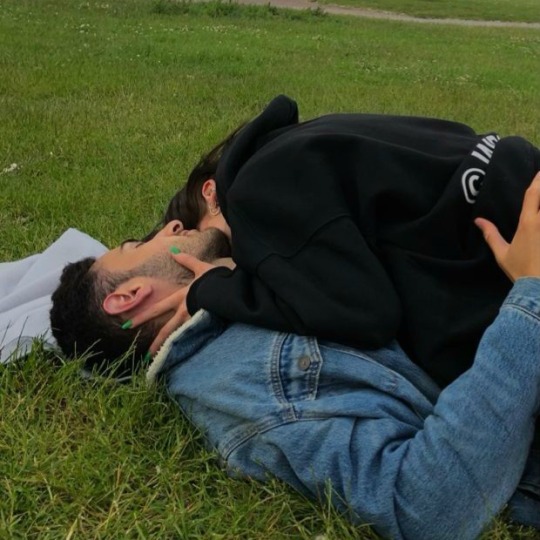
liked by user1, user4 and 517 others
cuteguy congrats darling @yourinstagram
view all 75 comments
harryfan60 see?? she isn’t dating Harry
↳ harryfan58 I fucking knew it ↳ harryfan62 hope this pr nonsense stops
user14 little sus but alright ig randomguy cool bro user44 dude there’s no way she hasn’t cheated on you lol user3 you guys are so fucking disrespectful can you pls leave this man alone???
↳ user26 I mean he’s the one who decided to go public so… 🤷♀️ ↳ user3 his ig being public doesn’t automatically mean you’re supposed to be rude tho.
user36 Am I the only one who finds this picture adorable?
↳ user38 me too!! i was looking for a nice comment about it lol thanks! ↳ user36 I mean they definitely look like a couple and idk it’s a cute pic :( ❤️ liked by author
Sep 10, 2021 •
~~~~~~~~~~~~~~~~




liked by annetwist, bestfriend, cuteguy and 63,879 others
yourinstagram update time: went out for a run and my lungs got on fire. view was great though. zero complaints. also the show last night was INCREDIBLE.
view all 13,719 comments
bestfriend shut up you actually went for a run??
↳ harrystyles I wouldn’t call that going for a “run”. ↳ bestfriend okay that actually makes more sense now ↳ yourinstagram excuse me?????
harryfan OMFG harry interacting with yourbff???
↳ harryfan5 I KNOW! where are you @bestfriend are you still alive??? ↳ bestfriend no ↳ bestfriend but im pretending to be cool about it so 🤫 ↳ harryfan OMFHAJDHPAHDJ ILY
cuteguy 😍 user7 yessss! two days in a row!!!! thank you!!! user1 looks so prettyyyyyy! hope you’re doing okay <33
↳ yourinstagram i am!! thank you love <333
yourbrother Won’t believe you’ve moved your ass to be healthy until I see it.
↳ yourinstagram the fact that you dont believe me wont change the fact that it happened :D
harryfan15 harry is such a stalker. interacting with her posts when he doesn’t even follow her lol harryfan25 Anne started following her!!! user10 Not to rush you, but are we getting more videos anytime soon? I was so used to getting one every week… :( user25 So… She’s officially dating that cuteguy, isn’t she?
↳ user17 What? Who said that? ↳ user25 TMZ updated that article of her and Harry having dinner with this picture of them ↳ user17 Oh… Where can I see this picture? ↳ user25 She’s tagged on it. @cuteguy posted it ↳ user13 i wouldn’t believe (or read) TMZ guys ↳ harryfan68 funny how you won’t believe TMZ when it’s about this guy but you’ll believe them when it’s about harry ↳ user13 lmao I’m not in that fandom so I couldn’t care less about her dating harry or not.
harryfan13 SO WE ARE ALL GOING TO IGNORE THE FACT THAT HARRY AND YN WENT OUT FOR A RUN TOGETHER?????
↳ harryfan60 Yes bc no one actually believes they did. Next. ↳ harryfan68 hahaha you ate this one
Sep 10, 2021 •
~~~~~~~~~~~~~~~~
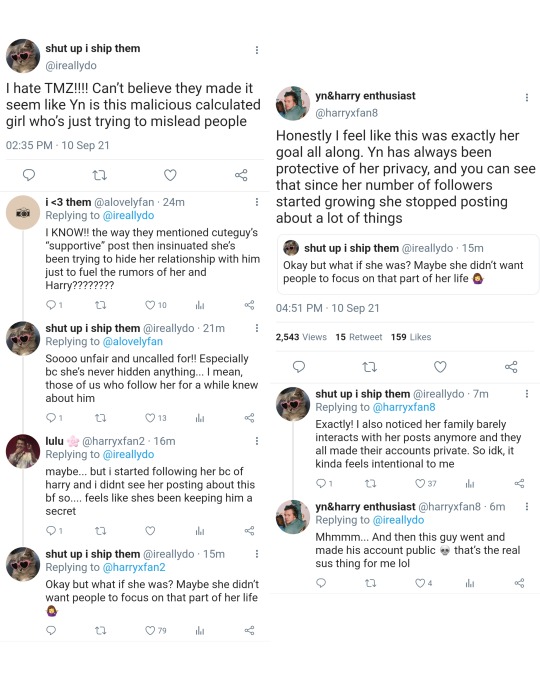
~~~~~~~~~~~~~~~~

liked by harryfan, harryfan2, harryfan3 and 4,375 others
harryupdates A fan met Harry in San Antonio today!
According to the fan, Harry said he was on a tight schedule so couldn’t stay for a chat, but agreed to take a quick picture and thanked her for going to the show.
view all 675 comments
fanwhometharry “Thank you so much I hope you enjoyed it”, those were his words exactly :’)
↳ harryfan27 OMG IT WAS YOU?? YOU’RE SO LUCKY ↳ fanwhometharry I know!! Thank you!!! ↳ harryfan24 was he alone?? ↳ fanwhometharry No, he was walking with his personal trainer and Yn ↳ harryfan52 his personal trainer also has a name btw and it’s Brad ↳ fanwhometharry Sorry, I don’t keep up with his personal trainer 🤷 I only know Yn bc I watch her youtube videos ↳ harryfan9 don’t apologize they’re always finding something to complain about lol happy for you!!
harryfan72 How convenient… He always agrees to take pictures when Yn is around 🙄
↳ harryfan68 right??? almost as if he WANTS people to spread the word…
harryfan13 I KNEW I WAS RIGHT AND THEY WERE TOGETHER
Sep 10, 2021 •
~~~~~~~~~~~~~~~~

liked by annetwist, bestfriend, cuteguy and 61,574 others
yourinstagram DALLAS! you are sooooo so pretty <3 we arrived yesterday and im already in love. it was a sunny afternoon so i went out for a walk, and as i was on my way to buy some flowers to myself (bc i wanted some so i got some) i had one of those surreal moments thinking about how lucky i am to be where i am right now. im always waiting for this feeling to eventually go away so i can come back to my “old life” and my “old self”, but now im kinda considering that as time goes by and i get to know more and more places, it will actually only grow bigger and bigger, right? :’)
(in that case, feel free to unfollow me now bc the annoyance will only grow bigger and bigger as well — consider yourself warned.)
view all 14,102 comments
sisterinlaw The summer vibes are gorgeous! harryfan42 WAS HARRY WITH YOU???? user1 another post??? feels like going back to the old times im so happy!!! harryfan64 this girl won’t even post her face and she got like 4k new followers in one day
↳ harrystyles82 It’s the Harry Styles effect ↳ harryfan64 glad im not the only one who sees it 🤡
harryfan YN? DID YOU ACTUALLY JUST SAY I WANTED SOME SO I GOT SOME???
↳ harryfan5 i saw that too i was like… okay 😂 ↳ harryfan9 hahaha I hope she actually did get some tbh ↳ harryfan13 ME TOO!! ↳ bestfriend yes. she 100% did ↳ harryfan9 😲 ↳ harryfan lmaoshuahsjbjh ↳ harryfan17 wait @bestfriend she 100% say “i wanted some so i got some” or she 100% got some? ↳ harryfan23 oh god i cant believe this is a real conversation you guys are having HAHAHA
user17 please keep feeding us with your random cute posts!! <3 i love them!! bestfriend fgs @yourinstagram have some manners bestfriend i thought you didnt like exposing yourself like this bestfriend also… your mom is on instagram so… bestfriend PLEASE
↳ yourinstagram omfg shut upppp ahusdhjahj ↳ yourinstagram stop encouraging the nonsense behavior??? ↳ yourinstagram you KNOW i meant the flowers ↳ yourinstagram i wanted some FLOWERS so i got some FLOWERS ↳ bestfriend yeah i know 💐 ↳ bestfriend sorry its just too funny sometimes 💋
loveynrry did anyone else notice yn hasn’t liked THAT picture yet? 👀
↳ user4 which one? ↳ loveynrry the one @/cuteguy posted ↳ user4 ohhhhhh 👀 ↳ user4 also did you notice yourbff doesn’t follow him ↳ user9 shit @user4 i hadn’t noticed that ↳ loveynrry i did, yeah… thats why im sus about him ↳ user4 I mean, I trust yourbff judgement soooooo……
Sep 11, 2021 •
~~~~~~~~~~~~~~~~

~~~~~~~~~~~~~~~~


~~~~~~~~~~~~~~~~
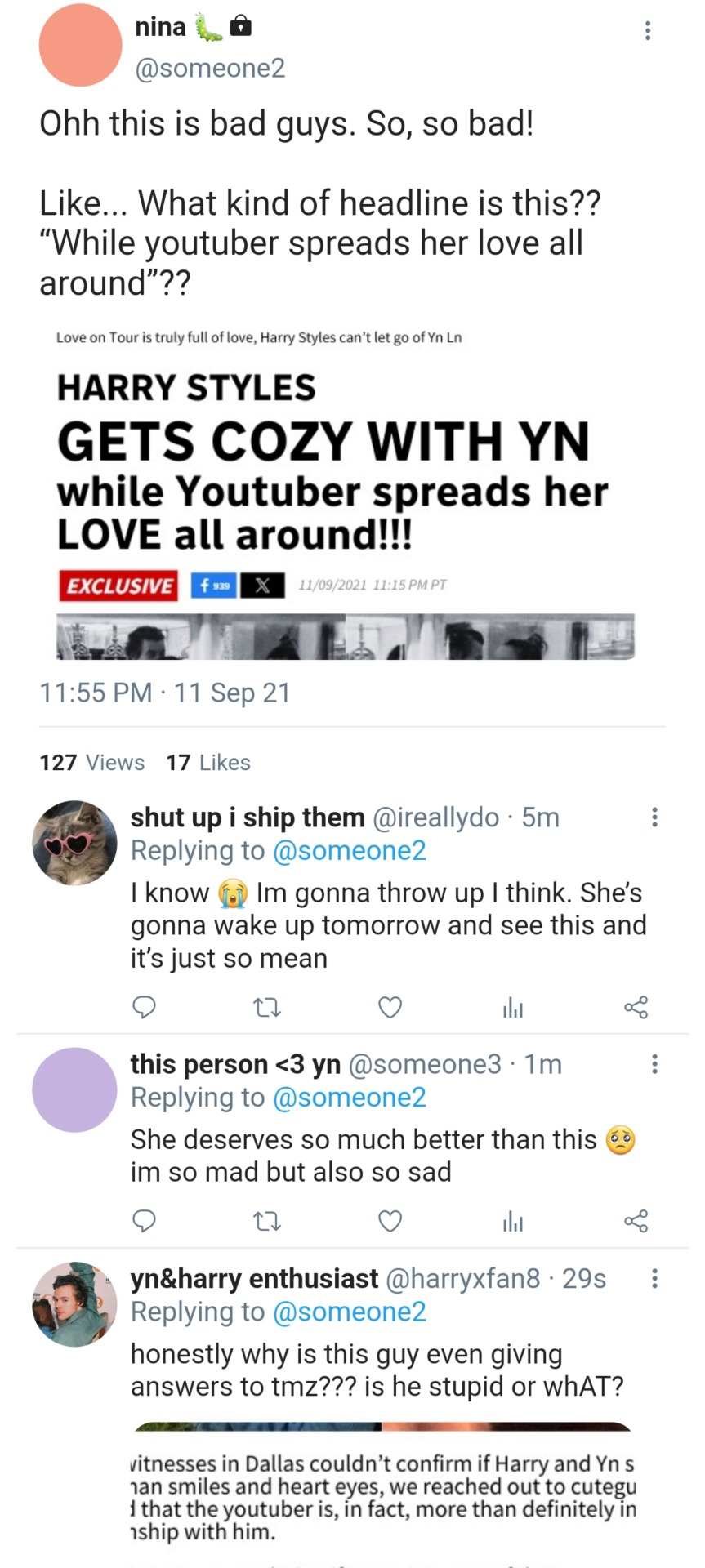
— — — — —
PART 6: PHILLY AND DC
— — — — —
#harry styles fake ig#harry styles fake instagram#harry styles fake social media#harry styles smau#harry styles social media au#harry styles writing#harry styles#harry styles blurb#harry styles fanfic#harry styles fanfiction#harry styles fic#harry styles fluff#harry styles x reader#harry styles x y/n#harry x reader
287 notes
·
View notes
Text
4Minutes EP. 4 - My Takeaways
For the sake of organization: my future takeaways will be under #mambo.4minyap (get it? hehehehehe) cause it seems to be hitting the radar for lots of folks. It's also an interesting series, and I like talking and taking the scenic route while doing so!
Compositional Framing: The Relationship of Oppression
We got the most information about Korn's character and status within the story from this episode thus far: but the visual devices popped out the most for me (I am an artist after all LOL). I mentioned camera angles, specifically bird's eye view in my episode 1 takeaways, but we're met with a different element: shot sizes! I'm not a filmmaker so please go easy on me (my credentials include my storyboarding and animated illustration classes so my knowledge is limited), but what remains consistent throughout this episode is Korn's relationship with authority and power through the usage of establishing shot size, which lots of his scenes with various characters have varying heights.
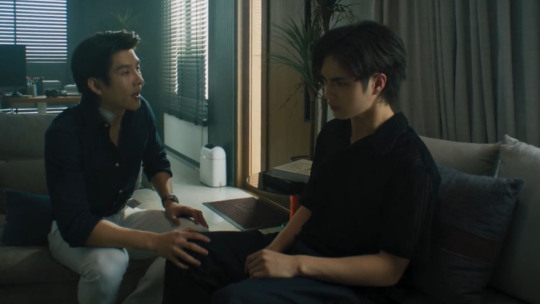
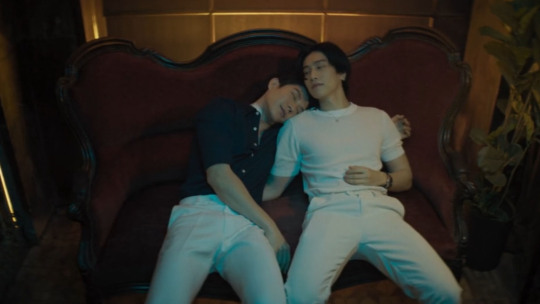
Tonkla (Authoritarian) vs. Great (Equals)
The way Korn approaches these two characters have their obvious differences in relation to himself, but the common thread is that these two characters are individuals Korn should love. It's expected to love your family unconditionally, and arguably, love your partner even more than that. But as we've seen the story play out, starting from Korn and Great's family dynamics (which I've also covered in episode 1!): love has always been conditional.
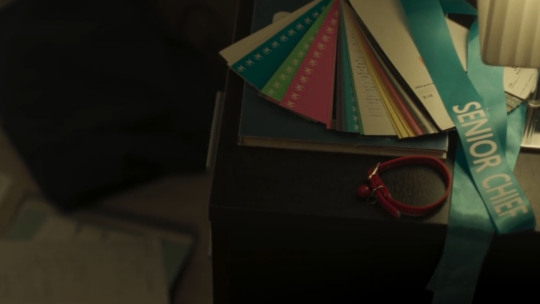
Their relationship is revealed from a flashback that Korn and Tonkla are established boyfriends since their university days, however, dating in secrecy. This further contributes to Tonkla's stress and anxiety within the relationship, slowly escalating once he realizes the mistreatment he's tolerating. I found the symbolism between the pet cat's collar and Korn's "senior chief" sash interesting: there is ownership involved, which is mistaken for partnership.
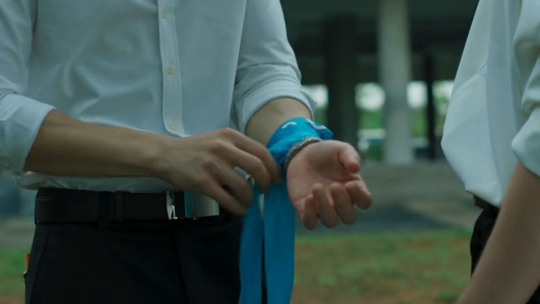
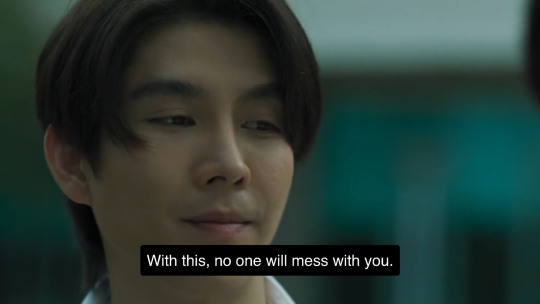
From the jump, Korn doesn't view Tonkla as an equal partner to him, but someone who he can assert dominance over (which is primarily physical but also emotional). By displaying acts of love such as helping Tonkla through his first time and being present during Tonkla's loss with his deceased pet cat, what seems innocent and kindhearted on the surface actually has more context (which due to the 30 image limit, y'all are going to have to watch the episode for yourself and take my word for it LOL).
In the university flashback, Korn mentions keeping the cat's collar as a memento, but he's not the one reaching in and taking the collar off the cat: Tonkla is. Tonkla also isn't the one who puts on the "senior chief" sash himself: Korn is. In both scenarios, Korn is the one making decisions for Tonkla during his moments of vulnerability (both in a state of grief and during a sexual act). I checked out this article to make sure my facts are straight (got too many fun facts up my sleeve), but this approach is how cults target and recruit their victims:
Possible situational vulnerabilities include illness, the death of a loved one, breakup of an important relationship, loss of a job, or moving to another city, state or country.
Is this deliberate, or is it Korn's act of kindness? We can only infer at this moment where Korn falls on the value spectrum, but he's definitely a morally gray character (you can argue with your mom idc). During the after care scene, Tonkla mentions his father (which is alive during this flashback, but not presently living during the funeral ceremony) and moving to a new place with his younger brother due to his father's alcoholism (and possible physical abuse but this is only an assumption). Korn handles this interaction by providing financial stability (cough cough financial abuse) for Tonkla in the meantime, establishing a relationship rooted in give-and-take, debt and IOUs, under the guise of a caring romantic relationship. Given that Tonkla and his brother have suffered from trauma relating to family dynamics and enduring dysfunction into adulthood, I can see why Tonkla had become completely blindsided to this level of power imbalance that is simply all too familiar.
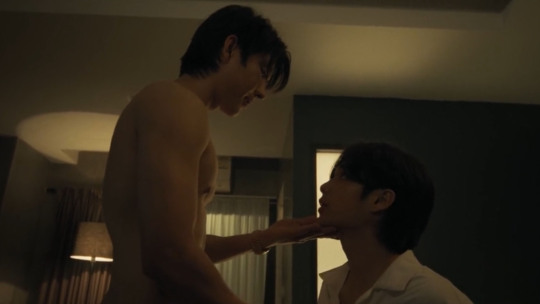
Once Tonkla realizes that Korn is only present in his life for his own self-interest, and access, he stands up against his oppressor, recognizing that there is another individual that is displaying signs of love and care (which isn't 100% healthy, but it's progress nonetheless) that Korn has bread crumbed him for all these years.
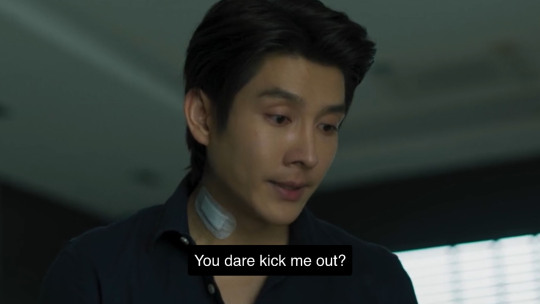
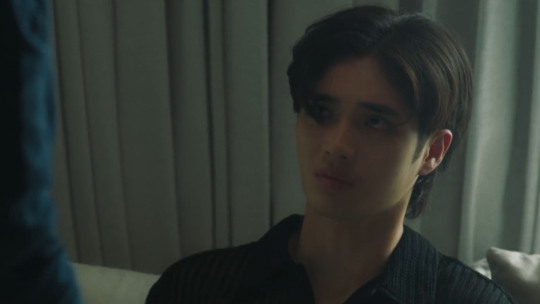
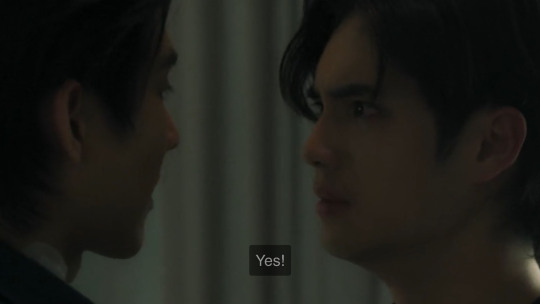
This confrontational scene is highly intense and emotional, which is reinforced by Korn's physical stature towering over Tonkla in most of the scenes we've seen thus far in each episode and usually ending with Korn continuing to be enabled. These scenes are usually shot at angles such as panning from above to reveal Korn's power over Tonkla, who's usually shot from over-the-shoulder and panned down. However, once Tonkla finally takes his stand against him, the camera follows him and frames the shot as a close up, tightening the gap between Korn as the oppressor and Tonkla as the oppressed.
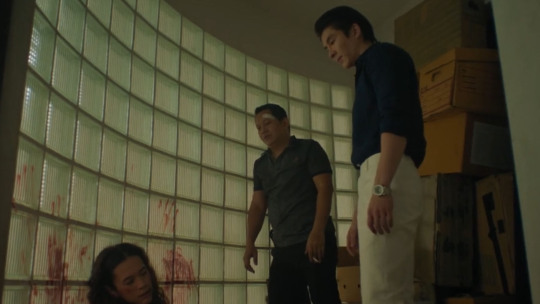
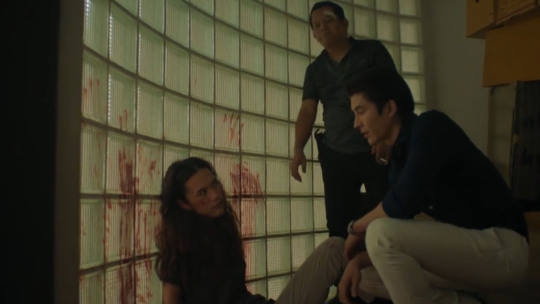
Once Korn leaves and returns to question Nan about the leaked information: we're shown a similar staging of Korn physically towering over his victim, but from a cowboy shot slightly panned upward. However, the framing suggests from size relationship alone: Korn is nothing more but a victim himself playing the role of the villain. He is in the same predicament as his own victims, but living in a state of falsehood and denial as he has been trained to believe it is his birth right to take over his father's business (not even taking the time to question the morality behind such a business). What remains behind choosing moral righteousness over injustice: the disappointment of living as a failure and abandonment of his family system, the only consistently good thing in his life that is his younger brother Great. It's heartbreaking because we can see somewhat of goodness from his beaconing of retrieving information without the reliance of violent methods (which is unsuccessful and out of context, rather pitiful?), and I really do hope that he will be able to redeem himself (but I wouldn't completely write off the series if he does not deserve redemption).
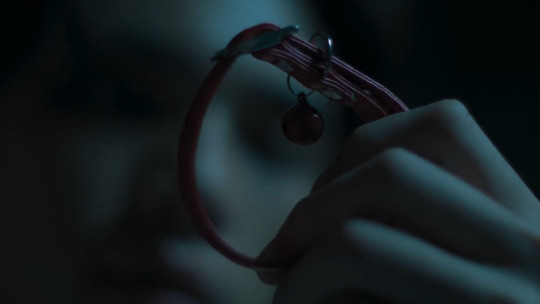
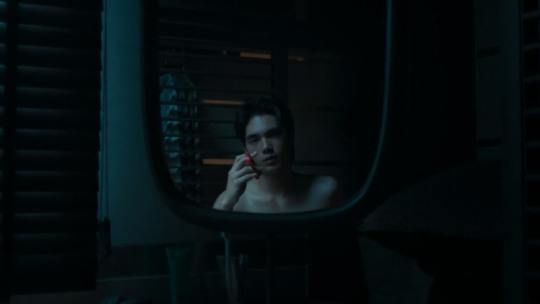
However, the greatest loss is Tonkla's revelation of his own entrapment: reminiscing the memories held by the collar but in an entirely new perspective. The composition of him looking at himself in the mirror is hauntingly beautiful but full of melancholy: the mirror serves as a moment of literal self reflection, the collar reminding him of living as a possession rather than a person, the frame of the mirror serves as a metaphorical cage. Now it's a matter of whether or not Tonkla will reclaim his power again and recognize that he's simply a bird confined in his cage, but the door is now wide open. Will he realize soon that he has his own wings to fly?
Moral Value: A Hidden Responsibility
We've seen in this episode Great having a better understanding of his gift, establishing his moral compass and duty to act with integrity and with a strong sense of justice. Seeing such strong character development within these past few episodes is breathtaking (especially if you've been a long time supporter of Bible and just his journey as an actor). We have a good sense of Great recognizing his autonomy and relationship with free will, contrasted to how passive and reluctant he was in doing the "right" thing and being given a second chance to make a different decision.
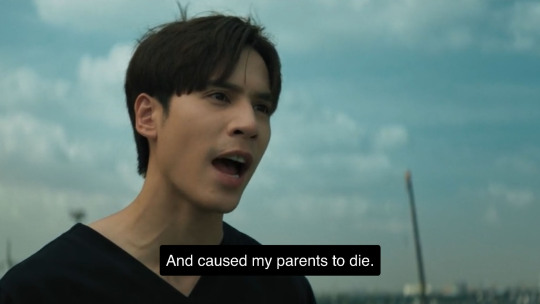
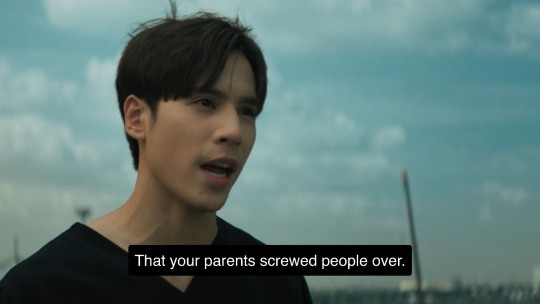
Tyme's motive reveal (I love being right hehe) after being confronted by Great's demand for why he attacked his brother became a turning point for Great to finally tap in and establish his innate desire for moral justice, especially after being told about Nan's captivity and being foreshown her demise once he found her location. What I found most interesting during the initial rescue of Nan from Samarn was just how "normal" his conduct was when addressing Great as the son of his upper head. How polite his language was while holding a gun and standing next to a pool of his victim's blood, to just before Tyme's appearance where Great becomes the voice of reason amongst the chaos.
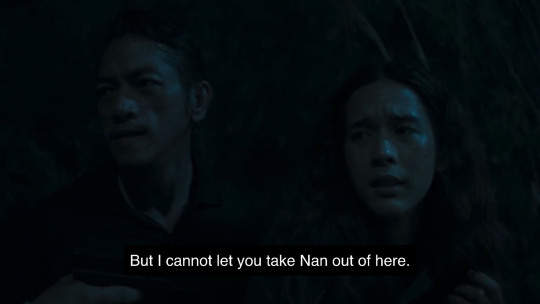
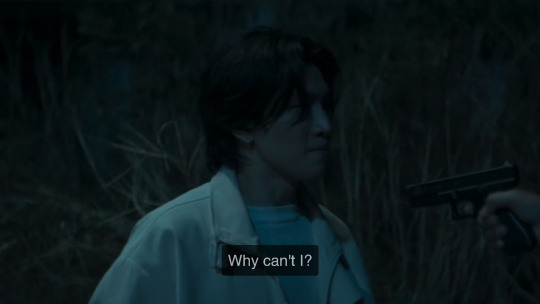
"Why can't I?"
It's such a simple response, but it's so loaded with depth and hidden meaning: it makes you sit back and also wonder...why can't I?
Great becomes an individual questioning the circumstances surrounding him, enabling himself to experience change. When his "friend" attempted murder and brought him along for the ride, when he experienced his first few heart attacks and hitting the woman seeking unalivement, when he is confronted by his brother's attacker and doesn't blindly dedicate his loyalty to his brother for the mere fact that he's family, when he sees Nan's predestined death in the hands of the enemy (which you can say that it really be your own people).
What makes Great such a fascinating character to me is just how dynamic and determined he's become after being gifted with foreseeing the future. Having such excitement in his awareness to his free will makes me enjoy him more as a character, that our lives are not predetermined to live and die for, that we have morals and values that must be considered and analyzed for its legitimacy, that we have integrity to do what's right without entitlement to self-interest, that we have the shared responsibility to criticize the world in which was built for us, but our jobs to upkeep and maintain. I'm excited to see what's in store for Great moving forward, and I'm so happy for Bible and Jes to play such characters.
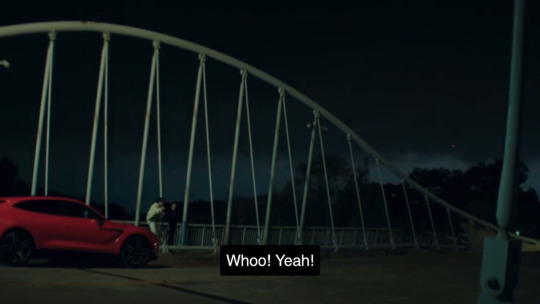
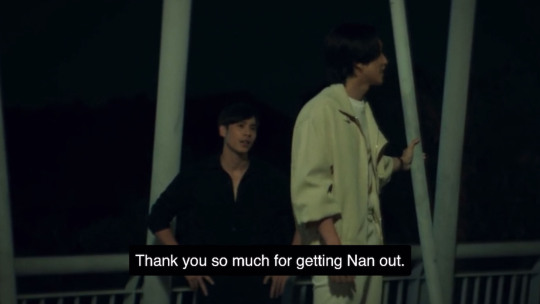
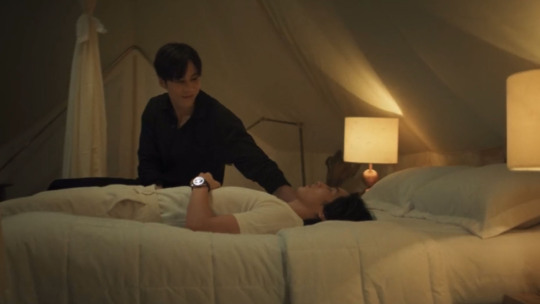
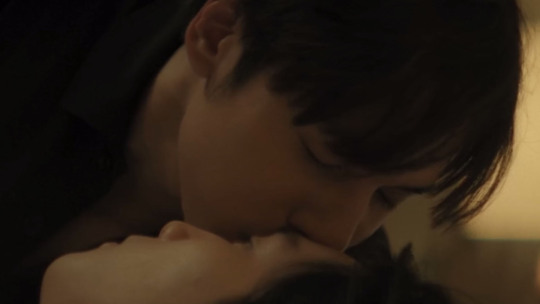
Even though the lighting is similar to how Korn and Tonkla's flashback was, the visible warmth is even more obvious with how these two established their relationship. That in contrast to KornTonkla's ownership, TymeGreat is partnership (we haven't reached boyfriend status yet but it's coming!) How Tyme is willing to accept and make room for Great's excitement and passion, to hold it gently, to cherish it as a fleeting moment. Their NC scene in comparison to KornTonkla and WinTonkla is simply ethereal: the level of shared vulnerability and intimacy warmed my heart. From the lighting to the shots and down to the chosen score, the director does a fantastic job of creating such dissonance between all the pairs (which lots of people like to write off NC scenes as unnecessary and vulgar but it's just blatant purity cultural standards imposing on all of us and I need to dedicate another time to talk about it). The visual storytelling thus far has me anticipating more from the story as the details continue to establish the worlds revealed to us.
Tonkla's Brother: The Arrival of Home
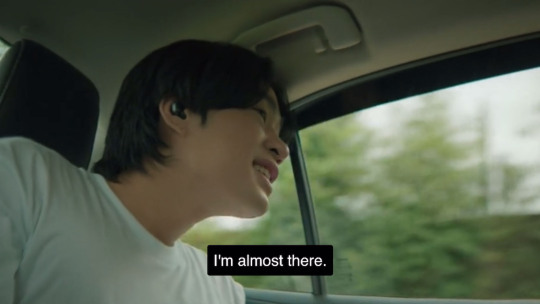
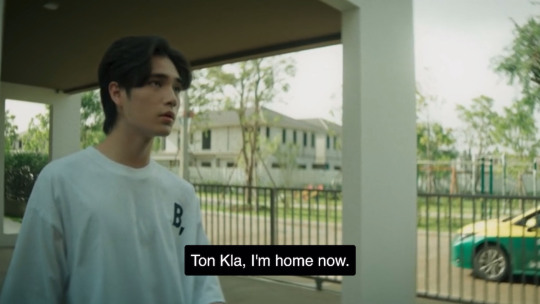
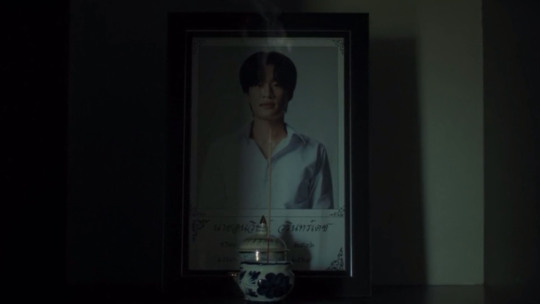
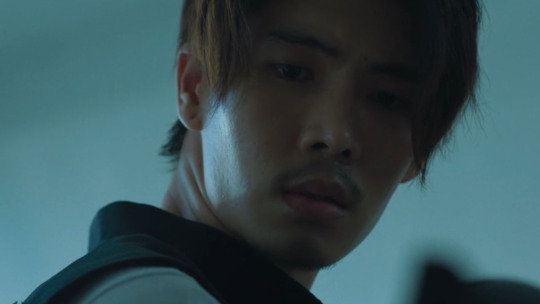
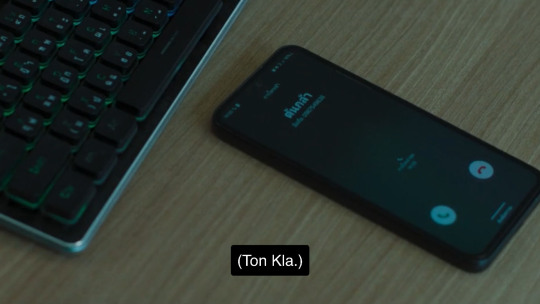
I'm sure we all saw this coming but the reveal is heartwrenching. To see such a sweet face and scene filled with hope and longing with its immediate contrast to harsh reality, my heart goes out to Tonkla. Some may infer that there's a separate timeline that exists alongside reality, but I think it's possibly a hyperrealistic hallucination or dream by Tonkla (since the last scene we see of him was just before heading to bed for the night but also his intense codependency on drugs). Of course on the surface, people can infer that this is simply Dome returning home from recovering from his injuries: however, I interpreted it philosophically. Dome arrived home for his soul to rest.
We're shown in the first half of the episode of Tonkla mourning after Dome's body is cremated (I'm also Buddhist but I'm nationally American and ethnically Vietnamese so my interpretation of the religion will have its differences), which now establishes Dome's physical remains returning to the earth which his soul can no longer return to. I imagined Dome's soul has reincarnated and given access to the Western Pureland (since Tonkla was physically outside in the warm sunlight versus his more cool toned coloring within his scenes), only hoping that he actually experienced resting on his deathbed ready to enter the afterlife with a smile. Now we know that Tonkla's fingerprints were already in the investigation database: we need to know why and what crimes he had already committed before the murder shown as the opening in episode 2. This is definitely going to affect Win's current dynamic with Tonkla, given that they're now living together and he has access to Tonkla's home and possessions. Maybe we'll experience another shift in character development like how Great was, but possibly targeting Korn if the company is involved in Dome's case somehow.
Honorable Mentions: Heart Attack Transition
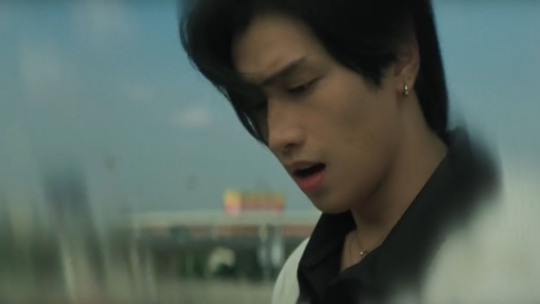
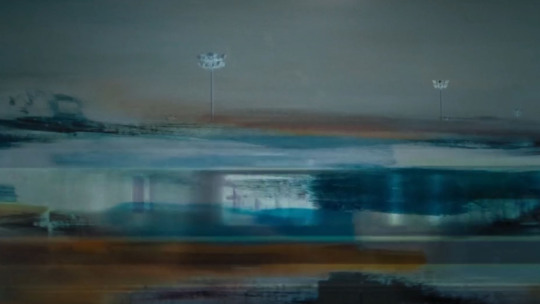
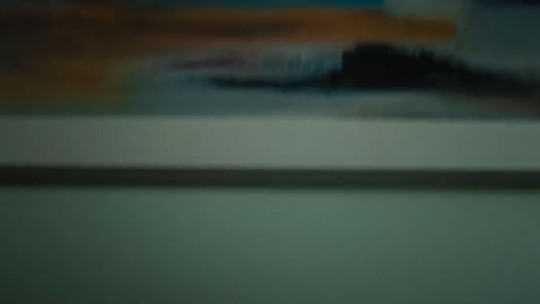
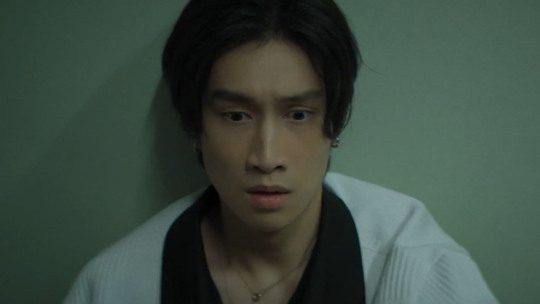
This scene was literally so fucking cool. The match cuts and in and outs of the inversion (def going to have trigger warnings for future GIF sets) were literally out of this world, especially when I find out it's from the freaking painting within the hospital hallway that is just a prop on the surface. I wonder who suggested such a transition and I wonder how they'll depict Great's future heart attacks and visions. The VFX team is working overtime and I'm so impressed so please give them their flowers!
#4 minutes#4minutes#4 minutes the series#bible wichapas#jes jespipat#bas asavapatr#jjay patiphan#fuaiz thanawat#thai bl#thai drama#thai series#bl series#mambo.4minyap#mambo.speaks#i had a lot to say today#it was clearly important to me#so whoever reads: i hope you have a field day hehehe#this episode was really just a trip#i couldn't control my facial expressions out in public so the person sitting across from me while tonkla's getting fucked against the wall:#i promise i'm normal
111 notes
·
View notes
Text
TIFF: And so it continues...5 to ZFF

Aaand "Russians at War" is going to be at the Zurich Flim Festival. Because of course.

The Russian Canadian director Anastasia Trofimova met a soldier on home leave in Moscow's subway, accompanying him to the front lines, where she spent over a year filming unauthorized footage in a battalion near the Ukrainian border. In her film, she gives voice to soldiers who have no understanding of the war's causes and soon find themselves mourning comrades who have become Putin's cannon fodder. This harrowing and unique war documentary captures images you would never see in the news media. 'Who are the Russian soldiers who are fighting against Ukraine? What do they think of Putin? The documentary has them speak their minds. A film that revealed more to me about this conflict than 100 newspaper articles.' – Christian Jungen Anastasia Trofimova Anastasia Trofimova was born in Moscow and is a Russian-Canadian filmmaker. She first studied communications and political science and then international relations. Trofimova is a renowned filmmaker who has made a name for herself through her work in conflict zones such as Iraq, Syria, Lebanon, Russia and the Democratic Republic of Congo. In her films, she addresses social inequality and injustice. She has been honoured with the Canada Screen Award and has participated as a jury member at the News and Documentary Emmy Awards five times. RUSSIANS AT WAR (2024) / CONGO, MY PRECIOUS (2017) / VICTIMS OF ISIS (2015) / HER WAR: WOMEN VS. ISIS (2015)
No mention of RT in the director's bio of course. Same shit, different film festival.
Also, if this propaganda film reveals more to you about the war than 100 news articles, that's not shining praise for the film, but rather an indictment of the sorry state of our collective media landscape in Ukraine and the West.
The West obviously has a problem of not reporting on Ukraine as often anymore. It's not "fashionable". A lot of the reporting I've come across is superficial and there is rarely a deep dive into the Ukrainian civilian aspect of the war. It seems there always has to be either a grotesque catastrophic event due to Russian aggression (like the Okhmatdyt children's cancer hospital), or an interesting enough topic in order for something to be considered (like the Mykola Hryshko national botanical garden being in danger of losing its tropical plants due to the war causing electricity cuts.) There is a dearth of human interest stories, which is the core of understanding this war and the effects it has on Ukrainians.
When there is such a story, it falls into the situation of the "box-ticking approach", as described by Dr. Olesya Khromeychuk:
It is not enough to simply ‘do Ukraine’ by reviewing one book on the war, especially if it’s by a Western journalist rather than a Ukraine-based author. It’s not enough to host one exhibition, particularly if it is by an artist or photographer who only spent a few weeks in the country. Quickly putting together a panel on Russia’s war in response to a major development at the front and adding a sole Ukrainian voice at the last minute doesn’t cut it either. This box-ticking approach is unhelpful and insulting.
Most if not all of the quotes I pull from human-interest stories are from Ukrainian journalism. If you've been following me for the short time I've had this blog up, you'll notice I read a lot. At this point I've given up on looking up Western based English media, because the core stories that define the war are just not there. If there is an interesting article from the West, I'll usually see it pop up on my Twitter feed (like the botanical garden story) and I'll take a look then because its been recommended and has what I'm looking for.
And finally, Western media can't let go of having some Russian expert talk about Ukraine, instead of actually talking to Ukrainians.

Kate from Kharkiv: Ukrainian media, both in Ukrainian and English, must improve their regional reporting. They are increasingly resembling local Kyiv media, which limits global awareness of events across Ukraine. Consequently, international media rarely cover these regions unless we die en mass. But not too often, because if often it is not news anymore.
Like Kate from Kharkiv points out, mass-casualty events are no longer "fashionable". She further indicates the lack of essential reporting in specific regions where conditions are different from Kyiv. One such example is the Russians turning Kherson into a "human safari". Initially, only Zarina Zabrisky was reporting on how Russian drones pilots were deliberately targeting civilians, and she shouldn't have to be the only one reporting on this. While there are some Western news outlets that have reported on this situation now, it's still not enough. Zarina Zabrisky is still diligently doing the bulk of the work in reporting on this. I can only imagine what other stories in other regions are going untold because there is little to no coverage.
The other obstacle I've noticed is accessibility to news in Ukraine from a language perspective. There isn't enough English language coverage from Ukrainian media outlets. While I would love to be able to read Ukrainian confidently, I'm nowhere near there yet, and the West is collectively even further away. Google translate isn't a great substitute either for obvious reasons. The number of times I wanted to read/watch a news report, and there was no English supplement is a lot. It happens frequently with the English language Ukrainian news accounts I follow. They'll post a clip from a news report with no translated subtitles and say, "look at this!", but I can't extract the information they want to show because of this problem.
This is why I hold volunteer translators as some of the most valuable contributors in the information space, and I will always credit them.
It's a vicious cycle. If a large proportion of Ukrainian news media is inaccessible to Western media due to the language barrier, information has even less of a chance of being noticed and spreading. This is, in my opinion, the other side of the coin on issues in the information war.
#Ukraine#Zurich#Switzerland#russians at war#Russian propaganda#screen reader friendly#Zurich Film festival#ZFF#media#journalism#Ukrainian journalism#language barrier#long post#Kate from Kharkiv#Zarina Zabrisky
60 notes
·
View notes
Text
Thoughts on the Hunger Games movies while I recover from oral surgery, as someone who read all of the books back in the late 00s-early 10s when they were first popular but never really fell in love with them or anything
some of these movies fall HARD into the trap of Dark Scenes Where You Can't Tell What's Going On
Oh well I guess someone is getting killed in this part of Catching Fire because I heard screaming and a canon, but damned if I can tell who or how
my thoughts on the continued use of conventionally feminine-coded aesthetics, activities, and general Vibes to represent decadence and evil are, as always, extremely active
why is decadence and evil always represented by artistic fashionistas who love elegant buildings and classical music? why is it never represented by hyper-masculine Elon Musk tech bro assholes who have home gyms and want all buildings to be High Capitalist featureless glass towers?
I mean I shouldn't be surprised; this goes back at least to the French Revolution and has roots in both misogyny and homophobia. and it's not like artistic fashionistas can't be evil and decadent obviously. but there's no single aesthetic with a monopoly on wasteful carelessness, and yet that one seems to always be the one filmmakers and authors pick
it's not like the Female Protagonists are even unfeminine to make up for it. they're just a more toned-down version of conventional feminine attractiveness and they show no evidence of enjoyment or working for it. yawn.
my solid Meh reaction to the Katniss/Peeta love story remains intact. least interesting part of the whole franchise IMO. I'm always surprised that it got so popular as to eclipse the actual plot in the eyes of fans- it's not even that good a love story! they're barely in love for so much of the narrative and then all of a sudden they're soulmates!
I love and have always loved the fact that the Rebels(TM) aren't morally pure or even necessarily that much less calculating than the Capitol in some ways. they're the better option, by a mile, for Panem. but they're also people on a mission who aren't above using their enemy's tactics to make that happen. they have to be stopped from starting up the same cycle of killing and revenge against the children of the Capitol, even. in the end, the only people you really come away liking are Katniss, her family, her allies, etc.
81 notes
·
View notes
Note
it's so weird seeing people misusing marxist language to be anti-ao3. otw isn't stealing the labor of writers. writers don't have to post there. we can post on ffnet or wattpad or any other site. writers can even make a new site ourselves, like otw did. it also feigns ignorance to the fact that otw/ao3 is nonprofit. if anyone has any doubts, they can request to see otw's form 990 from the irs. it's not some big secret. no one is hiding information. because it's nonprofit, we can all find out this info for ourselves. and it also pretends as though otw/ao3 makes money by abusing others' labor. it isn't google or apple. running the site, itself, is labor. free labor. because it is, again, a nonprofit. go to ffnet where they actually do make money from whatever you post. no one is forcing you to post on ao3. no one is forcing you to keep up with them. put action behind your words and stop using the site so you can make your own.
--
It's the usual myopic, individualistic view where only artistic "genius" counts. Secretaries and agents and janitors alike are just unimportant props to launch The People Who Matter into prominence.
People see artists as lone creators, which is more true of authors than of, say, filmmakers, but is still pretty much bullshit. All the other labor of getting something out the door and then of getting it in front of eyeballs is ignored in favor of this Lone Great Man way of thinking.
It boils down to "Boo hoo, why can't I have a free storefront and marketing department? Those aren't real work!"
197 notes
·
View notes
Text
Okay, this is the conclusion to my posts about Sophia Stewart. I'll never do something like this again
Everything I've posted is from her own book or her web presence btw. That's all I'm drawing from and if anyone tells me any information about her they gained any other way I'll block them immediately so uh, don't
Towards the end she reveals some of her other pitches. By showing she copywrote sequels to the Matrix and Terminator
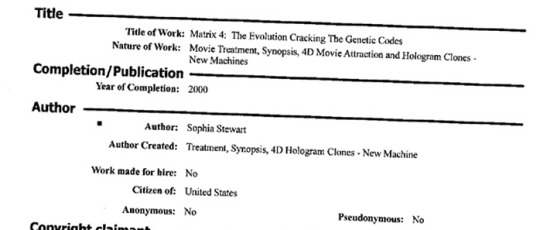
Lots of strange details here - she wrote The Matrix 4 in 2000? They didn't even start filming The Matrix 2 & 3 until 2001. Also, we can see in this book that her pitch has nothing to do with The Matrix or Terminator, but she claims she wrote direct sequels to both?
(Her explanation for how both very different films are ripping off her work - a 1:1 copy, she claims - is, hilariously, that The Terminator plagiarizes it front to back, while The Matrix plagiarizes it back to front. What?)
But also she didn't write it. She registered copyright on a synopsis for The Matrix 4. She has concepts of a plan for a Matrix 4.
The book ends with a pitch for another...she calls it a book, but it's a movie pitch? And this, too, is just a synopsis for some grand epic series, light on detail of character and plot and heavy with lore and rants (in this case, primarily about God and Adam & Eve). Of course her exhaustively long but barely sketched-out epic movie pitch has a prologue, which is also full of Christian-tinged Ancient Aliens pyramid power woo.
Sophia Stewart is unimportant, bc she represents a class of writer. Writers who have Ideas. Who have outlines and plot points but no real story, bc they never write it. But they think just having Really Good Ideas is enough - that you should get credit for coming up with a good idea for a story, regardless of if you make an actual story out of it. They're a "writer", but they never write. Despite this they often have a deep case of Dunning-Kruger, churning out outlines that leave out basic details like "what happens in the climactic battle" and the personalities of characters while insisting that an inability to author anything shouldn't keep you from being praised as a genius author
If that type of person is lucky enough to have money, they become a studio executive or tech guy, both professions awash in the uncreatively creative, or they hire ghostwriters. If they're not, they become the type of person to file spurious lawsuits under the misapprehension they own basic plot concepts. It's the "I coulda made the majors!" of writing, except, you know. Baseball players who didn't make the majors still actually played baseball at some point. I assume from now on all those types will just pump their outline into ChatGPT and try to sell the gunk it slops out and then claim they 'wrote' it so uh, uhhhhhhhhhhhh
The only reason I made these posts was discovering the conspiratorial angle to her work, bc who cares if a major studio has to deal with a spurious lawsuit? That was the part that actually sucks. But also, she does a lot of press: profiles on news websites, podcasts, that documentary was even made by other filmmakers, who actually make films. It's persisted from blogs and chain emails all the way to podcasts and TikToks. All of this uncritically spreads her story, but I also have to ask: how many actual African-American science fiction writers do those platforms profile? How many of them get documentaries made about their work? How much air is being sucked out of the room by the decades long misinformation about the "true" creator of The Matrix? And why is that misinformation so persistent when it takes a trivial amount of effort to find out it just isn't true? It feels good to support the underdog against the big studio, but in this case it just isn't true.
The sad truth is a lot more Hollywood plagiarism cases look like this than are real exposures of wrongdoing, but people tend to accept them at face value since they feel like a little guy taking on a corporation, though in reality it's just two writers suing each other. Take The Holdovers case, where people immediately turned on it, but if you look into it, the two scripts have very little in common, and the accusing writer makes odd claims like a human character in The Holdovers being a ripoff of a billboard in his script.
Or look at Groundhog Day, which was accused of plagiarism by Richard A. Lupoff, writer of the story "12:01 P.M.". The two stories have nothing in common besides a time loop; in Groundhog Day he's reliving a day, in 12:01 PM he's reliving an hour. Groundhog Day is a romcom, 12:01 P.M. plays it for horror. Groundhog Day never reveals the source of its lop but it's clearly fantastical in nature, 12:01 P.M. is explicitly science fiction. In Groundhog Day he escapes the loop, in 12:01 P.M. he never does. You can't deny Lupoff felt personally slighted, but at the end of the day, a world where a writer could own the concept of time loops would be a dystopia where creativity and art would die.
But even though they were wrong, The Holdovers & Groundhog Day cases were based on real works of writing that existed. They were based on a real, if misguided, sense of violation from the writers. But in this case, we have a mere outline of a story with not even basic similarities to the stories she's claiming are a 1:1 copy of her work, and decades of media appearances based on exploiting a community college media student's mistake in 2004. Anyway seems bad
26 notes
·
View notes
Note
Hi Slug!! I'm curious about some of the religious imagery in hypmic! Kuko is obvious and I think Doppo has talked about not believing in gods before but what's up with Jakurai? Is he meant to actually be Christian or is it just an aesthetic thing?
This ended up being so long Tumblr wouldn't let me put it all in one post. Hoo boy. Under a cut for length.
Usual disclaimer that I don't live in Japan, so I'm not talking about IRL Japan so much as Japanese media. Media isn't perfectly synonymous with real life and, of course, it's foolish to draw conclusions from the general (media and culture) and apply them to the specific (individual persons). With that being said, media is indicative of real life values and cultural concerns--for example, the American high school experience is a lot less interesting than in movies, but these movies reflect a romanticization of teenagehood so widespread in the US and areas with heavy US cultural influence that filmmakers take it for granted in their audiences--so I can talk about what assumptions inform the portrayal of religion in Hypmic.
As in a lot of Japanese media, religion is present but not explicitly mentioned outside of Kuukou. It's what I would call culturally religious as opposed to actively religious. Similar to how many works in the Anglosphere are steeped with Christian ideas and phrases even if the authors/works themselves aren't Christian (the Christian concept of sin, using "God" or variations as an interjection, etc.), many works written in Japanese are influenced by Shinto and Buddhist ideas. Some people in Japan are active worshipers of Shinto, Buddhism, or both, but many more have a somewhat relaxed approach. It's not uncommon for people to have a belief in a higher power, but the nature of this higher power isn't terribly well-defined. Many people will attend religious ceremonies for holidays or funerals but rarely pray to a higher power outside of moments of great stress. That is, being culturally religious. Traditions are fun and comforting, especially if they involve dressing up in fancy clothes, eating yummy food, and seeing friends and family. Even if you're not especially devout, it doesn't hurt to pray for a bit of luck before a big test, that your child will grow up healthy and strong, or that your recently departed ancestor will be at peace. For those in predominately Christian areas, you probably see plenty of this in your community--people who maybe go to church occasionally for companionship or holiday celebrations but aren't active worshipers. Or, perhaps, people who pray like, "Hey, if anyone's listening, can you lend me a hand?" Maybe you're even one of these people yourself. We can generally assume that most of the cast falls into this camp. Doppo and Hifumi go to a festival with a religious element--charms and rituals to bring good luck by appealing to Shinto deities--but I doubt either of them have a firm belief that these particular deities exist. They may think that there's some higher power...or not. But what's the harm in a good luck charm, right? And more importantly, it's fun to play games, eat, drink, and horse around with friends! But wait, does that mean these two are only Shinto or...Shinto-ish? Probably not. There's an expression that most Japanese people are "born Shinto, but die Buddhist." Shinto rituals tend to focus on matters of the living (although Shintoism has its own distinct funerary rites, sometimes combined with Buddhist rites), while non-devout Buddhists usually participate in Buddhist ceremonies only when loved ones die. We see Juushi and Hitoya with loved ones buried in Buddhist cemeteries, but it's safe to assume both observe Shinto holidays and customs in some fashion. We also see in the very beginning of TDD that Nemu and Samatoki have what appears to be a butsudan--a Buddhist altar--in their home dedicated to their deceased parents. "But wait," some might say, "I thought spirit worship isn't a part of Buddhism." That's true for some forms of Buddhism, but not all! Buddhism is enormously varied, and some of the (many, many!) forms of Buddhism practiced in Japan accept aspects of Shintoism. There's plenty of mixing, just as we see within individuals themselves. Again, the Hypmic characters may not fully believe that spirits exist. (Well, outside of Ramuda...) But it's a comforting thought that one's deceased family members are around in some form and can be a positive influence on one's life.
76 notes
·
View notes
Text
Welcome To The Monkey House
I swear I didn't mean to write this much. I only wanted to know the title of the novel, but noooooo. I just had to overanalyze this single moment in the movie.
Remember this book Mae picks up?

I had to squint at this shot for longer than I'd like to admit. I could only see the author's first name, and I struggled to pick up the last name when Trevathan said it. Forget about making out the actual title. Fortunately, after a bit of digging, I found it! It's 'Welcome To The Monkey House' by Kurt Vonnegut. Very fitting, given Mae's circumstances. Welcome to the monkey house indeed, Mae, haha!

The book is a collection of 25 short stories, one of which is actually titled 'Welcome To The Monkey House.' Kurt Vonnegut is known for weaving satire and science fiction into his stories that explore themes and his criticisms of war, religion, science, and politics.
And so, like any normal, sane person would do, I whipped out my tinfoil hat and read the story with my POTA goggles on and tried to find any connections and similarities to Kingdom. Here's a link to a free PDF version for anyone curious.
First, a very quick summary.
Warning: It features sexual assault and a questionable portrayal of women. That's the 60s for you.
Earth is facing an overpopulation problem with 17 billion people. The world government decides to tackle this problem through two methods. One is through Ethical Suicide Parlors where people go to volunteer to be put to sleep. The other is the government mandating everyone take ethical birth control pills, which make one numb from the waist down. People are still able to reproduce, but the pleasure of sex has been taken away.
Nancy is a hostess at one of these parlors, and she's told by the local sheriff there's a criminal called Billy the Poet who is known for kidnapping hostesses and forcing them to have sex with him. He's a nothinghead, which is someone who doesn't take the ethical birth control pills. They're called nothingheads because they are "bombed out of their skulls with the sex madness."
Billy succeeds in kidnapping Nancy, waits for the effects of the ethical birth control pills to wear off, and takes her virginity. However, the story portrays this assault as a necessary evil. Billy's previous victims actually help him with kidnapping Nancy because they're grateful and understand why he did what he did to them. Billy is remorseful about what he did to Nancy, but he does it because he believes the law is wrong and this is the only way to make others understand.
It ends with Billy giving Nancy a bottle of normal birth control pills that will allow her to feel pleasure and not reproduce. The label on the bottle says Welcome to the Monkey House.

Okidoki! Now lets overanalyze this baby. I'm no Vonnegut expert, and I've only read this single story of his, so any Vonnegut enthusiasts will have to forgive me for any inaccuracies, lol.
Before I continue, I'm not saying this is necessarily what the filmmakers intended. They most likely included the book because of the title and they thought it was clever. The other most likely reason is that both Kurt Vonnegut and Pierre Boulle, the latter who is the author of the original Planet of the Apes novel, were writers who used scifi to explore themes of science and religion in their books. However, where's the fun in the simple answer? JOIN ME IN MY DELUSION!

Nancy Reminds Me Of Mae
Okay, kinda? They're two vastly different stories, but let me explain.
Both Mae and Nancy have been raised to believe the government is right on how to solve humanity's main problem, even if it's wrong. Mae believes the world belongs to humans and not apes, and will do whatever it takes to complete her mission that will help put humans back on top. Nancy believes nothingheadedness and sex are to blame for the world's problems, so people should follow the law and take the pills that strip them of their pleasure.

Mae and Nancy dislike people from another group. Mae has been raised to fear and hate apes. Nancy's disdain for nothingheads is apparent when after the effects of the ethical birth control pills had worn off, she tells her captors, "I may be a nothinghead now. But that doesn't mean I have to think like one or act like one."
Finally, Mae and Nancy's worldviews start to change after their encounter with a person from the other group. Mae believed apes are to be feared and despised, but meeting Noa challenges those beliefs. Nancy is shocked to learn that the women who helped Billy kidnap her had gone through the same thing, foreshadowing that Nancy's beliefs will change just like theirs. Both Mae and Nancy don't completely switch sides by the end, but seeds of doubt have been planted in their minds, and with time, will come to understand that what they've been raised to believe is wrong.

Welcome To The Monkey House Meaning
Okay, remember that label with the phrase Welcome To The Monkey House on the normal pills? Let me explain the reason for that.
The story explains how the ethical birth control pills were originally used on monkeys. The creator of the pills had decided to take his eleven children to the zoo's monkey house after church on Easter, but was appalled to find monkeys...um, well, playing with their little rocket, if ya know what I mean. This led him to create these pills for the monkeys so that visits to the monkey house are more appropriate. Now humans are mandated to take these same pills or risk jail.
So when Bill gives Nancy a bottle of normal birth control pills with the label Welcome To The Monkey House, it sounds like a call to join the other side. For Nancy to join the nothingheads. Join the ones that are seen as sick with sex madness, when in reality it's just normal human sexuality. The phrase suggests the nothingheads are like monkeys, inappropriate and out of control. Comparing other groups of people to animals is a common way to dehumanize them and portray them as evil, but in 'Welcome To The Monkey House,' the real dehumanization is stripping people of their sexual pleasure, an integral part of being human that is also observed in many animals, including monkeys and other primates.
Now if I were to continue drawing parallels between Mae and Nancy, the phrase Welcome To The Monkey House would quite literally mean just that for Mae. Mae would join the monkeys. Well, in this case, the apes. Through her relationship with Noa, she'll realize humans and apes are the same, and that she is no better or worse than this other group she sees as animals.
Okay, I'm Done.
One last thing. This part made me chuckle. Both Mae and Nancy are capable of choking people and breaking their necks, apparently!


#planet of the apes#kingdom of the planet of the apes#pota#kotpota#noa#mae#my english teacher would be proud of me I think#trevathan#my theory#this is me rambling
26 notes
·
View notes
Text
4K UHD Review: The Guyver

Following in the wildly successful footsteps of Batman and Teenage Mutant Ninja Turtles, The Guyver takes a (relatively) grounded approach to its outlandish source material — in this case, a Japanese manga series — without divorcing itself from its comic book roots. Produced by Brian Yuzna (Re-Animator, Society), the 1991 film is directed by special effects wizards Screaming Mad George (Society, A Nightmare on Elm Street 4: The Dream Master) and Steve Wang (Predator, The Monster Squad).
As the Star Wars-esque expository opening crawl explains, mankind was created by aliens as an organic weapon. The evil Chronos corporation is further developing a technology that allows humans to change into "super monster soldiers" known as Zoanoids for world domination. The only viable defense against them is The Unit, a piece of bio-booster alien armor that increases a human's natural powers a hundredfold, turning them into The Guyver.

Mark Hamill's top billing may lead you to believe that he's the titular hero, but he instead plays a supporting role as a CIA agent investigating Chronos. The real lead is Jack Armstrong (Student Bodies) as Sean Barker, an amateur martial artist who's the only person that can activate The Unit. When his girlfriend (Vivian Wu, Teenage Mutant Ninja Turtles III) is endangered, Sean utilizes his newfound powers to take down Chronos and the Zoanoids.
Armstrong is a bland lead, but it's not entirely his fault. In addition to a mustachioed Hamill channeling Colombo, he has to compete with several scene-stealing character actors. Re-Animator's David Gale chews the scenery as the malevolent head of Chronos, briefly reuniting with Jeffrey Combs as the company's scientist, Dr. East (get it?). Michael Berryman (The Hills Have Eyes) plays Gale's right-hand Zoanoid with Jimmie Walker (Good Times) as his rapping goon. Linnea Quigley (The Return of the Living Dead) cameos as a scream queen.
But the real stars of the show are the creatures, the designs of which showcase boundless creativity. The Guyver looks like Ultraman by way of Clive Barker, and each Zoanoid adopts a different animal's traits. While a number of other artists were employed to pull off the myriad of monsters, George and Wang's fingerprints are all over the effects, imbuing the alien superhero movie with some disturbing body-horror.

Jon Purdy's script deviates significantly from source material not only in terms of story but also tone. While some of the manga's dark atmosphere and violence remain intact, it's undercut by goofy humor in an attempt to appeal to a younger demographic. Fans of Yoshiki Takaya's original creation were no doubt disappointed (Wang attempted a bit of a course correction with his 1994 sequel, Guyver: Dark Hero), but the tonal confusion is actually charming.
Originally cut down to a PG-13 rating in the US, The Guyver has been newly restored in 4K from the original, R-rated 35mm camera negative with DTS-HD Master Audio 5.1 and 2.0 options for Unearthed Films' 4K UHD + Blu-ray release. Far removed from the days of Jaws and Alien in which the monster was largely hidden in shadows, George and Wang put their creations on full display — and even with a crystal-clear restoration, the in-camera effects shine.
Two new audio commentaries are included. The first is a lively one with George and Wang, moderated by Budget Biomorphs: The Making of The Guyver Films author Dom O’Brien. It's not the most informative track — the filmmakers admit to not having seen the film in over two decades — but they're enjoying themselves so much that it hardly matters. The second commentary features creature crew members "Evil" Ted Smith and Wyatt Weed, who delve into the nitty-gritty of the effects.

Yuzna and George each sit down for thorough new interviews. Yuzna reveals that he's been approached about a remake, but the rights are complicated, while George's infectious energy lasts the entire 56 (!) minutes. Creature suit camera test footage is included with commentary options from George and Wang or Smith and Weed, while outtakes and a gag reel feature George and Wang commentary.
Other extras include: alternate title sequences in English, German and Spanish; English, German, Spanish, and French trailers (all carrying the alternate title Mutronics); and extensive promotional and production galleries. The collector's edition also comes with the soundtrack CD composed by Matthew Morse (Silent Night, Deadly Night 5: The Toy Maker) and a booklet featuring liner notes by O’Brien and Morse.
The Guyver is available now on 4K UHD via Unearthed Films.
#the guyver#mark hammill#brian yuzna#screaming mad george#steve wang#unearthed films#dvd#gift#review#article#david gale#jeffrey combs#michael berryman#linnea quigley#90s movies#1990s movies
21 notes
·
View notes
Text
Following the latest Megahex story on Instagram and feeling so perplexed by people in the comments talking about how cute the characters look and how sweet they are to each other, as if it's not a series that is explicitly about the worst people alive, whose intense toxicity is mitigated by Simon Hanselmann's vivid psychological understanding of these types. I'm pretty sure you're not supposed to genuinely like these guys or think that their relationships are anything but pathologically destructive. You're invited to relate to them insofar as what's wrong with them is a cartoon magnification of what's wrong with a lot of people; I'm certain that Megahex is not supposed to be comforting or validating in any way shape or form. This is totally a manifestation of this kind of fandom-poisoning where you automatically interpret everything as an adorable romance tinged with infantile eroticism, and you're either blind to or not at all interested in what the author is actually trying very hard to say. I had the same feeling the other day when Tumblr radar was showing this piece of fan art from The Bear where everybody was smiling and being lovey dovey and looking extremely kawaii; I thought, yeah that show does suggest that the characters still have some decency and love inside of them, but every single episode is about how the only way they're able to interact with the world is through emotional violence and substance abuse. Like if you want to watch a really snuggly show about cuddly friends, I would probably recommend almost anything but The Bear. I get all reactive about the fandom pathology because I think it keeps people from really enjoying and appreciating storytelling or practically any kind of thoughtful art, if the only reason you read or watch anything is to say "Well the characters can be cute if I remove them from the narrative and transplant them into a world where all they do is hug and smooch in a way that I can jack off to without feeling too unwholesome." I mean I guess it's none of my business if people hate fiction and filmmaking and they're just foraging for source material for their weirdly babyfied porn. And it's probably my own fault for continuously returning to a place where I'm extremely likely to see that material without even trying, even if I'm trying NOT to. I suppose the bottom line is that people have every bit as much right to make and enjoy that stuff as I have to complain about it. Re: "Let people enjoy things," if I actually had the ability to stop people from enjoying things, the world might look very different, but fortunately for everyone else, I do not hold that power.
21 notes
·
View notes